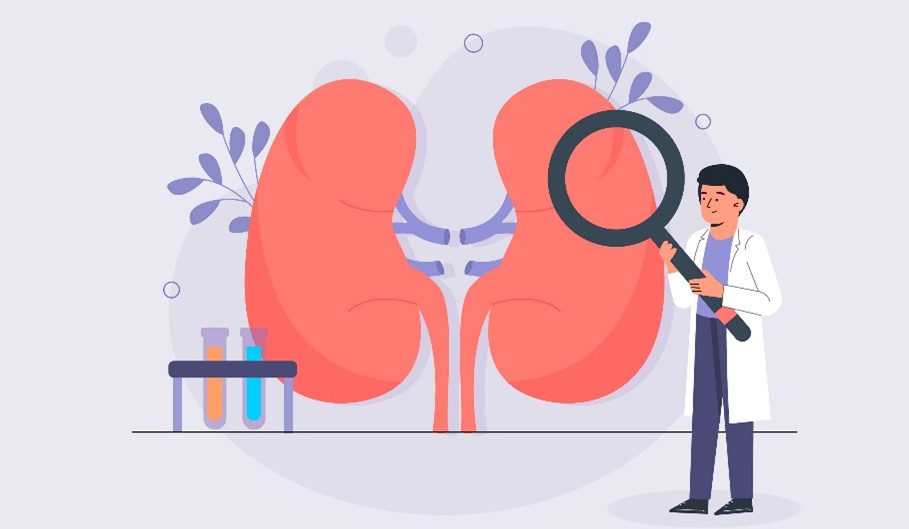
The heart and brain are often at the forefront of our minds when we consider essential organs that govern health. The kidneys, which are two bean-shaped organs situated just beneath the rib cage, are essential for preserving the body's internal equilibrium, particularly in terms of blood pressure. The connection between blood pressure and kidney health is so intricate that issues in one can directly affect the other.
This blog will examine the complex relationship between kidney function and blood pressure, detail the dangers that hypertension (high blood pressure) poses to kidney health, and offer practical advice for keeping both in peak condition.
The kidneys filter approximately 50 gallons of blood daily to eliminate excess fluids, waste, and toxins through urine. However, their function extends beyond just filtration:
The kidneys are closely connected to cardiovascular function, especially blood pressure, due to their regulatory roles.
The kidneys assist in regulating blood pressure through various mechanisms:
When blood pressure decreases or the body detects low sodium levels, the kidneys secrete renin, an enzyme that initiates a hormonal chain reaction:
This mechanism aids in raising blood volume and pressure.
The kidneys have the ability to hold onto or eliminate sodium and water, which has a direct effect on blood volume and consequently blood pressure. Too much sodium can cause water retention, which increases blood pressure.
The kidneys generate compounds such as prostaglandins and nitric oxide that assist in blood vessel dilation and maintaining pressure at safe levels.
Hypertension, or high blood pressure, is often referred to as the "silent killer" because it may not show symptoms until serious harm has been done. Which organ is most frequently affected? The kidneys.
Chronic high blood pressure harms the small, delicate blood vessels (glomeruli) in the kidneys responsible for filtering waste. With time, this results in:
Hypertension → Kidney Disease
The renal arteries narrow and harden due to high blood pressure, which diminishes the blood flow to the kidneys. The kidneys require sufficient blood circulation to work effectively.
There is a two-way relationship. Kidney disease can lead to or aggravate hypertension. Here’s the way:
This can lead to the emergence of a vicious cycle: kidney damage caused by high blood pressure → elevated blood pressure due to kidney damage → and so forth.
There are various medical conditions that clearly demonstrate the close connection between kidney health and blood pressure. These conditions illustrate not just how one can affect the other, but also function as key clinical examples of the two-way relationship inherent in this connection.
Although there may be no early symptoms of kidney disease and hypertension, you should watch for:
It is necessary to diagnose accurately and in good time to determine and control the link between renal health and blood pressure. Diagnostic examinations are essential for identifying initial indications of kidney dysfunction and tracking blood pressure levels.
Below are effective methods for maintaining both healthy blood pressure and kidney function:
Consult a healthcare professional if you:
Identifying and addressing issues at an early stage can avert damage that cannot be undone.
More than just neighbouring systems, the kidneys and blood pressure are mutually dependent. Your kidneys can be harmed by high blood pressure, which often has no symptoms; conversely, if your kidneys are damaged, your blood pressure may rise. If this perilous cycle is not addressed, it can result in severe complications such as heart disease and kidney failure that threaten life.
The positive news? You are in control. By adopting healthy lifestyle habits, following medical advice, and keeping an eye on your health from the outset, you can safeguard your kidneys and cardiovascular health for many years.
Rely on the specialists at Dr. L. H. Hiranandani Hospital for expert management of blood pressure and kidney health. The hospital is equipped to help you safeguard your kidney function and sustain optimal blood pressure with advanced diagnostic tools, a multidisciplinary team of nephrologists and cardiologists, and a dedication to personalized care. Make your health a priority and schedule your consultation today.
1. Can high blood pressure cause kidney failure?
Yes. If not properly managed, uncontrolled hypertension can over time harm the small blood vessels in the kidneys, resulting in chronic kidney disease (CKD) and potentially advancing to kidney failure (end-stage renal disease).
2. What is the ideal blood pressure to protect kidney health?
For people who are at risk of kidney disease, like those with diabetes or hypertension, the recommended blood pressure target is usually under 130/80 mm Hg. Keeping blood pressure in this range helps lower the risk of kidney damage.